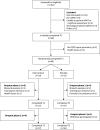Working memory training efficacy in COPD: the randomised, double-blind, placebo-controlled Cogtrain trial
- PMID: 34853784
- PMCID: PMC8628195
- DOI: 10.1183/23120541.00475-2021
Working memory training efficacy in COPD: the randomised, double-blind, placebo-controlled Cogtrain trial
Abstract
Background: Cognitive impairment is highly prevalent in COPD and is associated with a sedentary lifestyle, unhealthy diet and increased cognitive stress susceptibility. Enhancement of cognitive performance by working memory training (WMT) may reverse these effects. Therefore, this study aimed to investigate the efficacy of WMT in COPD on cognitive performance, healthy lifestyle behaviours and cognitive stress susceptibility.
Methods: The double-blind randomised, placebo-controlled Cogtrain trial consisted of a 12-week training phase comprising 30 active or sham WMT sessions, followed by a second 12-week maintenance phase with 12 sessions. Measurements took place at baseline and after the first and second phases. The primary outcome was cognitive performance. Secondary outcomes were the recall of prespecified healthy lifestyle goals, physical capacity and activity, dietary quality and cognitive stress susceptibility. Motivation towards exercising and healthy eating and psychological wellbeing were exploratory outcomes.
Results: Sixty-four patients with moderate COPD (45% male, aged 66.2±7.2 years, median forced expiratory volume in 1 s 60.6% predicted) were randomised. WMT significantly increased patients' performance on the trained tasks in the first phase, which remained stable in the second phase. Of the 17 cognitive outcome measures, only one measure of memory improved after the first phase and one measure of reaction time after the second phase. This intervention did not influence physical capacity and activity, recall of prespecified healthy lifestyle goals, psychological wellbeing or cognitive stress susceptibility.
Conclusion: WMT improved performance on the trained tasks but not overall cognitive performance, healthy lifestyle behaviours or cognitive stress susceptibility in patients with COPD.
Copyright ©The authors 2021.
Conflict of interest statement
Conflict of interest: M. van Beers has nothing to disclose. Conflict of interest: S.W. Mount has nothing to disclose. Conflict of interest: K. Houben has nothing to disclose. Conflict of interest: H.R. Gosker has nothing to disclose. Conflict of interest: L. Schuurman has nothing to disclose. Conflict of interest: F.M.E. Franssen has nothing to disclose. Conflict of interest: D.J.A. Janssen has nothing to disclose. Conflict of interest: A.M.W.J. Schols has nothing to disclose.
Figures
Similar articles
-
Working memory training in children with borderline intellectual functioning and neuropsychiatric disorders: a triple-blind randomised controlled trial.J Intellect Disabil Res. 2022 Jan;66(1-2):178-194. doi: 10.1111/jir.12895. Epub 2021 Nov 10. J Intellect Disabil Res. 2022. PMID: 34755919 Free PMC article. Clinical Trial.
-
The effect of transcranial direct current stimulation combined with working memory training on working memory deficits in schizophrenic patients: study protocol for a randomized controlled trial.Trials. 2022 Sep 30;23(1):826. doi: 10.1186/s13063-022-06776-x. Trials. 2022. PMID: 36175919 Free PMC article.
-
Working memory training in children with neurodevelopmental disorders and intellectual disabilities, the role of coaching: A double-blind randomised controlled trial.J Intellect Disabil Res. 2023 Sep;67(9):842-859. doi: 10.1111/jir.13047. Epub 2023 Jun 14. J Intellect Disabil Res. 2023. PMID: 37313626 Clinical Trial.
-
The benefits of simultaneous tDCS and working memory training on transfer outcomes: A systematic review and meta-analysis.Brain Stimul. 2022 Nov-Dec;15(6):1541-1551. doi: 10.1016/j.brs.2022.11.008. Epub 2022 Nov 29. Brain Stimul. 2022. PMID: 36460294
-
Tiotropium bromide. A review of its use as maintenance therapy in patients with COPD.Treat Respir Med. 2004;3(4):247-68. doi: 10.2165/00151829-200403040-00005. Treat Respir Med. 2004. PMID: 15350163 Review.
Cited by
-
Effects and mechanisms of supramaximal high-intensity interval training on extrapulmonary manifestations in people with and without chronic obstructive pulmonary disease (COPD-HIIT): study protocol for a multi-centre, randomized controlled trial.Trials. 2024 Oct 8;25(1):664. doi: 10.1186/s13063-024-08481-3. Trials. 2024. PMID: 39375781 Free PMC article.
-
Muscle endurance, neuromuscular fatigability, and cognitive control during prolonged dual-task in people with chronic obstructive pulmonary disease: a case-control study.Eur J Appl Physiol. 2025 Feb;125(2):409-428. doi: 10.1007/s00421-024-05608-x. Epub 2024 Sep 21. Eur J Appl Physiol. 2025. PMID: 39305368 Free PMC article.
-
Impact of cognitive capacity on physical performance in chronic obstructive pulmonary disease patients: A scoping review.Chron Respir Dis. 2023 Jan-Dec;20:14799731231163874. doi: 10.1177/14799731231163874. Chron Respir Dis. 2023. PMID: 37029090 Free PMC article.
-
Cognitive Interventions in Individuals With Chronic Respiratory Diseases: Protocol for a Systematic Review.JMIR Res Protoc. 2023 Jul 28;12:e48235. doi: 10.2196/48235. JMIR Res Protoc. 2023. PMID: 37505801 Free PMC article.
References
-
- Global Initiative for Chronic Obstructive Lung Disease (GOLD). Global Strategy for the Diagnosis, Management and Prevention of Chronic Obstructive Pulmonary Disease. 2020. Available from: http://goldcopd.org/
LinkOut - more resources
Full Text Sources



